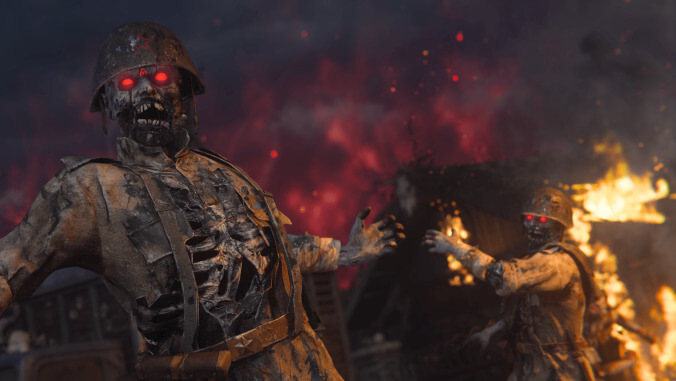The Call Of Duty machine is grinding the series into dust
It doesn't matter if each year's new Call Of Duty is good, all that matters is that there is a new Call Of Duty

Every Friday, A.V. Club staffers kick off our weekly open thread for the discussion of gaming plans and recent gaming glories, but of course, the real action is down in the comments, where we invite you to answer our eternal question: What Are You Playing This Weekend?
Every year since 2005, Activision has published a Call Of Duty game. That’s 16 main entries in the series, made possible by a rotating stable of developers and an increasingly large group of studios that exist just to support whichever one of them is running point on that year’s Call Of Duty. The idea is that each studio can spend two or three years making a game, but since there are so many studios making Call Of Duty games, Activision can put them out annually and keep making money.
And it’s a great way to make money! Which in no way means there aren’t a lot of problems with it. For one thing, having to plan years in advance always puts Activision on its back foot—typically forcing it to respond to trends rather than create them. It’s difficult to quickly move and react to new ideas in gaming or new advances in technology (one of the things Fortnite has excelled at) when you depend on these kinds of multi-year cycles.
Even worse: The one time in the last few years that Call Of Duty really did nail it—with 2019's (mostly) excellent Modern Warfare—the business model left Activision with no choice but to abandon the game after one year and push out a replacement 12 months later (2020's Black Ops Cold War) that was, frankly, awful. Competitors like EA’s Battlefield series put over a year between each game, regularly releasing new updates with additional content every once in a while to keep things fresh. Then there’s Fortnite, which is several years old, free, and constantly gets high-profile content updates.
2019's Modern Warfare could’ve been a game like that, one that runs for years. But because Activision needed to put out Cold War (at least partially so it would have something new to put on the Xbox Series X and PlayStation 5), it had to be dropped. Now, with this year’s Call Of Duty: Vanguard, Activision is trying to catch up to itself—specifically the itself from two years ago.
Vanguard runs on the same engine as Modern Warfare, bringing back then-new elements that it introduced, like doors you can open, or the ability to mount your gun on low walls. The menus all look the same. The deep weapon customization system, one of Modern Warfare’s highlights (you could turn a close-range shotgun into a long-range sniper rifle), is back, and almost identical.
Vanguard is better than Cold War, but that’s not saying much. Cold War might be the worst mainline Call Of Duty game they’ve ever put out, and the best things about Vanguard are just the things they lifted from Modern Warfare. There’s hardly any noteworthy innovation in terms of evolving the series, so it really just feels like a desperate move to recapture the glory days of… 2019.
But what will happen next year? And the year after that? There are rumors swirling that the 2022 Call Of Duty will be called Modern Warfare 2. But will it be good? Will it be new? Or will it just be an attempt to redo what worked two years ago? Activision’s Call Of Duty machine cannot and will not rest, so as depressing as it is, those questions don’t even matter. All that matters, to Activision at least, is that there will be a Call Of Duty next year.